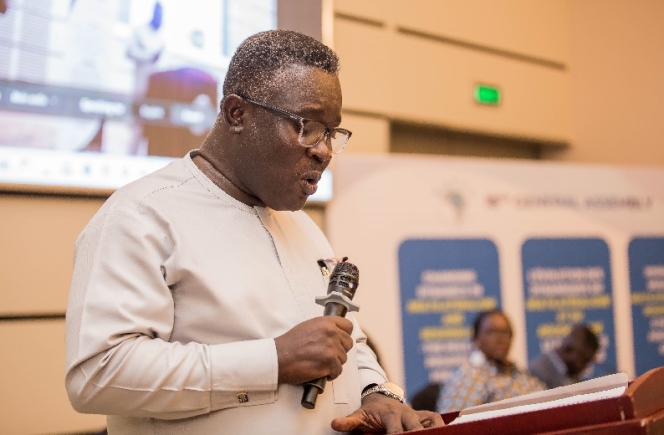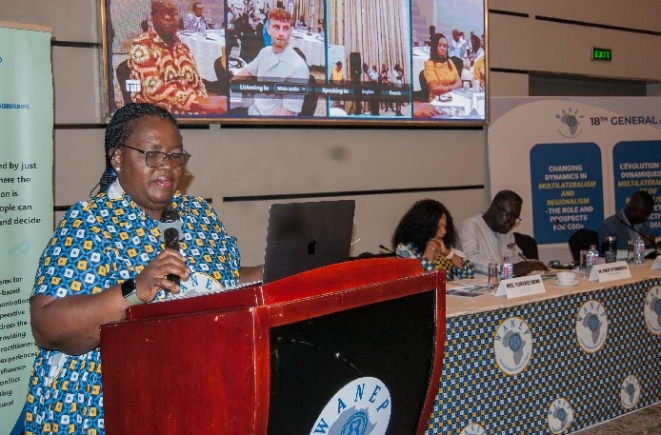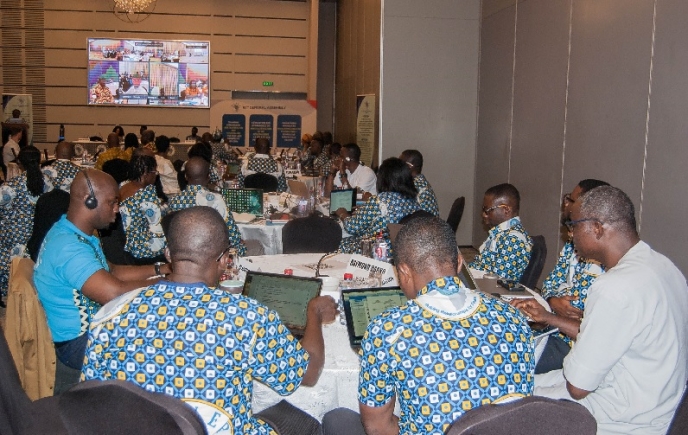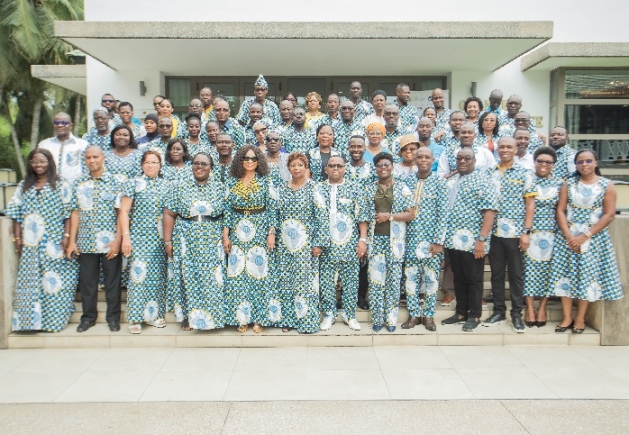A Senior Research Fellow at the Legon Centre for International Affairs and Diplomacy (LECIAD), Dr Philip Attuquayefio has highlighted the increasing challenges faced by Civil Society Organizations (CSOs) in West Africa due to the changing dynamics of multilateralism and regionalism in the region.
Dr Attuquayefio pointed out that one of the most immediate threats to CSOs is the crackdown on civil liberties and the restrictions on their activities that often accompany military coups and authoritarian regimes.
These developments, he said, have led to a shrinking civic space, tighter restrictions on freedom of association and expression, and, in some cases, the criminalization of advocacy work.
He also noted that while regional institutions like ECOWAS have traditionally played a role in promoting democratic transitions, their weakening enforcement capacity seems to be encouraging some states to implement more restrictive NGO laws, surveillance measures, and censorship, all of which limit the ability of CSOs to operate freely and advocate for necessary reforms.
"West Africa finds itself at the crossroads of several transformative trends. Global order is shifting with traditional power centers recalibrating their engagement with the region while emerging actors seek to redefine partnerships," he said.
"The economic community of West African states, indeed the African Union, continue to play central roles in regional governance. Yet they face challenges in responding effectively to the evolving security and political crisis that threatens stability."
"At the same time, recent unconstitutional changes of governments, insurgencies, the effect of climate-related insecurity, loading displacements and economic vulnerabilities have intensified pressures on governance and security structures, raising fundamental questions about the effectiveness of regional responses."
"In the face of these changing dynamics, we must ask, how do these transformations affect civil society in West Africa? How do CSOs adapt, influence and indeed sustain their relevance in an era where the very foundations of multilateral cooperation and regionalism are being redefined?" he added.
Event
Dr Attuquayefio was speaking at the 18th General Assembly of the West Africa Network for Peacebuilding (WANEP) on Wednesday, March 26, 2025, in Accra.
The two-day event, themed "Changing Dynamics in Multilateralism and Regionalism – The Role and Prospects for CSOs," focused on the evolving landscape of multilateralism and regionalism in West Africa.

Bringing together participants from across the region, the meeting also delved into the challenges and opportunities for Civil Society Organizations (CSOs) in advancing peace, security, and sustainable development throughout West Africa.
"I think the challenges we've seen in multilateralism themselves gives us an opportunity to really identify new pathways and new opportunities to enhance leadership and drive by local actors and therefore, through this general assembly we have that opportunity for the crucial reflections around how we can further build on the achievements, identify the gaps and most importantly shape the future of WANEP," Dr Attuquayefio added.
Evolving space
Dr Attuquayefio also emphasized that despite the significant risks posed by restrictive political environments, shifting donor priorities, and emerging challenges, CSOs that adapt by embracing digital transformation, diversifying their funding models, strengthening regional partnerships, and broadening their focus areas will remain crucial in shaping governance, development, and human rights across the region.
“The ability to anticipate changes, build resilience, and assert influence in new and evolving spaces will determine the long-term sustainability and impact of CSO action in West Africa,” he stressed.
![]()
“The stakes are high, but the opportunities are equally significant. CSOs in West Africa must rise to this moment, not as passive participants but as architects of a future that prioritizes peace, security, and the well-being of all.”
He continued: "CSOs would need to integrate these new voices, into their strategies, to remain dynamic and responsive to societal change. Beyond regional engagement, CSOs will also need to foster stronger alliances with international networks, particularly as traditional Western donors recalibrate their priorities."
"As we develop our next five-year strategic plan we must critically examine how we can position ourselves as an organization within this evolving multilateral and regional landscape and we must affirm our commitment to strengthening governance structures, deepening partnerships and ensuring that civil society remains a key actor in the region particularly in terms of peace and security frameworks," he added.
Strategic partnerships
WANEP Board Chairperson, Mrs. Florence Iheme, highlighted that WANEP has strengthened its strategic partnerships by consolidating long-term collaboration agreements with key development partners, including the Austrian Development Agency, Swedish SIDA, the German Development Agency for Cooperation (GIZ), and the European Union.
She also noted the renewal of the Memorandum of Understanding (MOU) with the ECOWAS Commission, which has now been extended indefinitely, as a significant development.
"Again I want to recall that we started with ECOWAS with two year MOUs and then graduated to five and now the MOU is indefinite and I think that says something about the operations and work of WANEP," she said.
"Institutional strengthening through ONEAP's Organizational Development Index, recorded a notable improvement from 75.83% in 2022 to 80.24% in 2023. This progress reflects enhanced governance, accountability and capacity building efforts across WANEP's national networks."
"However the evolving landscape demands that we continuously adapt and innovate. This assembly offers us a platform to assess our collective progress under the 2021 to 2025 strategic plan, take stock of achievements and lessons learned and lay a solid foundation for our next five-year strategy which will span 2026 to 2030. More importantly it allows us to reaffirm our commitment to strengthening institutional resilience and deepening partnerships to sustain our impact," she added.
Establishing WANEP Institute
In a goodwill message, Executive Secretary of the National Peace Council, Dr George Amu urged WANEP’s leadership to establish the West Africa Network for Peace Institute to drive efforts for peace and security across the continent.
He pointed out that issues such as justice, human rights, employment, and marginalization are undermining progress and making it challenging to achieve SDG 16. However, he believes that the creation of the WANEP Institute could play a key role in addressing these challenges.
Dr Amu emphasized the importance of maintaining interconnectedness, commending WANEP for its presence in all 15 countries within the sub-region. He encouraged continued collaboration with government institutions and civil society groups, recognizing WANEP’s strategic position to make a significant impact.

"I strongly believe WANEP is well positioned to lead the establishment of the West Africa Network for Peace Institute. This institute could serve as a regional hub to build the capacity of young peacebuilders in our sub-region," he suggested.
"I want to invite our donor communities to help this come true in our lifetime. I am confident that if we are able to do this with the support of peace infrastructures within the region, we are going to be stronger than we see ourselves today and grow a generation that will take over from us," he added.
Innovation
In her welcome address, WANEP’s Executive Director, Mme Mrs Levinia Addae-Mensah, highlighted that the complexities of democratic transitions, governance deficits, and security threats continue to require innovative and adaptive strategies.
She noted that these challenges raise important questions about the effectiveness of prevention and mitigation efforts by regional actors, including civil society organizations like WANEP.

"These challenges have significantly impacted on peace building efforts with some describing peacebuilding efforts as bridges under siege and one of course has been affected in terms of our ability to engage in conflict prevention, mediation and policy advocacy at national and regional levels," she said.
"Therefore, as we convene under the theme of this General Assembly, WANEP really acknowledges that this rapidly evolving landscape of global governance and regional cooperation amidst the geopolitical shifts, the increasing fragility and restructuring of multilateral institutions demands that we adapt and innovate and assert our relevance."
"As we gather for this assembly we have a crucial opportunity to assess our collective progress under our 2021 to 2025 strategic plan, take stock of achievements and lay a solid foundation for the next five years of our strategic plan and it's important at this point that we also acknowledge some of the efforts that we have collectively been able to achieve," she added.
Mrs Addae-Mensah also expressed her gratitude to the WANEP Board and staff for their steadfast support since she took on the role of Executive Director.
"This gathering is especially significant for me as it marks my first General Assembly since assuming the role of Executive Director," she said. "I would like to take this opportunity to express my deepest appreciation to the WANEP Board, our dedicated staff, and our esteemed partners for their unwavering support throughout this leadership transition."

